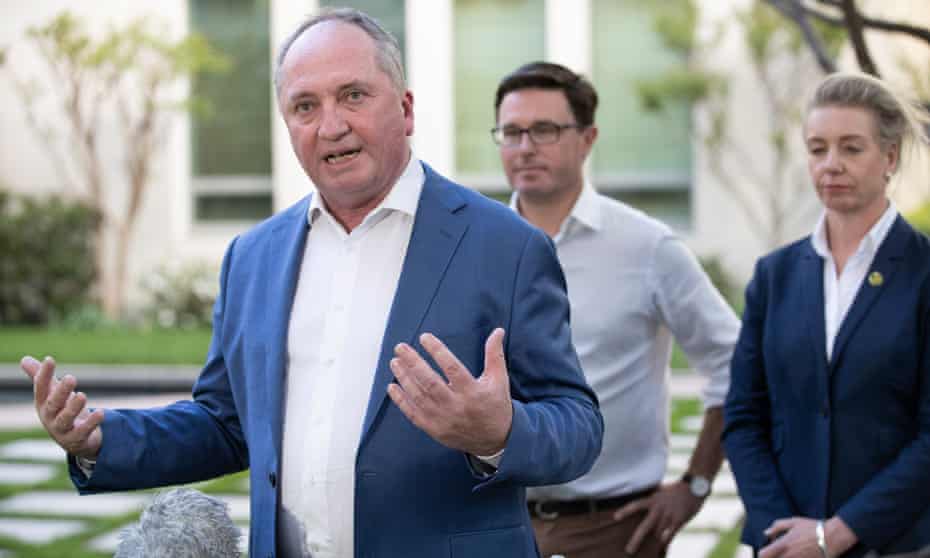Extract from The Guardian
Agreement is conditional on cabinet submission reflecting negotiations between Scott Morrison and Joyce, who refused to reveal if he supported the target.

Barnaby Joyce talks to the media with David Littleproud and Bridget McKenzie about the National party’s in-principle decision to support a net-zero emissions target by 2050 after Sunday’s meeting.
Last modified on Mon 25 Oct 2021 06.07 AEDT
Nationals MPs have agreed to sign up to a net zero emissions target by 2050, despite the opposition of leader Barnaby Joyce, in exchange for a regional transition package and an extra cabinet position.
In a two-hour long partyroom meeting on Sunday, Joyce said the party had agreed to a “process” to support the net zero target, dependent on cabinet signing off on a package that would protect regional economies.
While details of the package are yet to be made public, it is understood it includes a new regional future fund and an extra cabinet position that is expected to go to the resources minister, Keith Pitt, who was dumped after Joyce became leader.
The Nationals MP George Christensen, who has repeatedly threatened to shift to the crossbench, told colleagues he would now reconsider his position in the government in protest at the party’s position.
Christensen attended the meeting remotely wearing a “support coal” T-shirt.
The party’s Senate leader, Bridget McKenzie, also spoke against supporting the deal, and suggested Joyce could yet secure more for the party through the cabinet process.
Joyce was coy on the details of the package, and would not comment on whether he had advocated supporting the deal.
Sources present at the meeting said Joyce finished the meeting by telling MPs he did not support it, but acknowledged he was not in the majority.
A tally of MPs had 12 in support of the net zero target, and nine opposed.
“We are in support of a process going forward that would go towards the 2050 emissions target – obviously that’s dependent upon what we see in the cabinet submission and reflecting the conversations in the agreements between myself and the prime minister,” Joyce said.
“Out of respect for absolutely everybody in that partyroom, I’m going to keep any position of any person, absolutely private.”
“I said that this was the position, not of the leader, not of the executive, but would be a position of the partyroom, so we went through a process … to find the view of the partyroom, and the partyroom has made their view clear.”
He said the “easy decision” would have been to reject the deal and “join other people in screaming and yelling from the sidelines”, but this would give the party no influence over policy.
“The conditions that we have negotiated are by reason that we have a capacity to do it in the Nationals. And without a shadow of a doubt, the position regional people are in now is vastly better than they were before we started those negotiations.”
The prime minister, Scott Morrison, said he welcomed the Nationals’ in-principle support and looked forward to “this matter now being finally considered and determined by cabinet.”
“We recognise this has been a challenging issue for the Nationals. I thank the [deputy prime minister] for his leadership and his colleagues for their considered support. I greatly respect the process they have undertaken in reaching this decision.
“Only the Coalition can be trusted to deliver a plan to achieve net zero emissions by 2050 that will protect and promote rural and regional Australia.
“Ensuring regional Australia continues to grow and prosper is a core objective of any Coalition government, and this will be central to our plan.
“Australia will continue to reduce emissions while keeping our economy growing, maintaining affordable, reliable energy and ensuring our regions remain strong.
“That’s our Australian way.”
The deputy Nationals leader, David Littleproud, a supporter of the package, spoke with more conviction than Joyce about the partyroom’s decision.
“Today, our partyroom, respectfully got to a position of securing, but also growing regional jobs into the future, facing up to our international commitments, but making sure we have the safeguards and the protections there to ensure that all people in regional Australia can participate,” he said.
He said the technology roadmap presented by the energy minister, Angus Taylor, had given adequate “comfort” about how technology can “help grow new regional jobs”.
“This has been a very pragmatic discussion, very respectful and our party room with great maturity has got to a position that I think makes sense for regional Australia, and will support regional Australia, now and into the future.
The Nationals senate leader, Bridget McKenzie, said she was “proud” to be part of a political movement that doesn’t “shy away from the tough questions” and stood up for the most marginalised people in the country.
“They’ve only got one small group of people in this place to stand up for their needs and interests, which we have done in the face of an abundance of differing views.”
The Nationals MP for the seat of Gippsland, Darren Chester, said the decision was “a win for common sense”.
“I’m confident the positions agreed to by the Nationals and the prime minister will start the process of protecting our social, economic and environmental interests, but the task will be ongoing. There’s a lot of work to be done to protect regional families.”
No comments:
Post a Comment